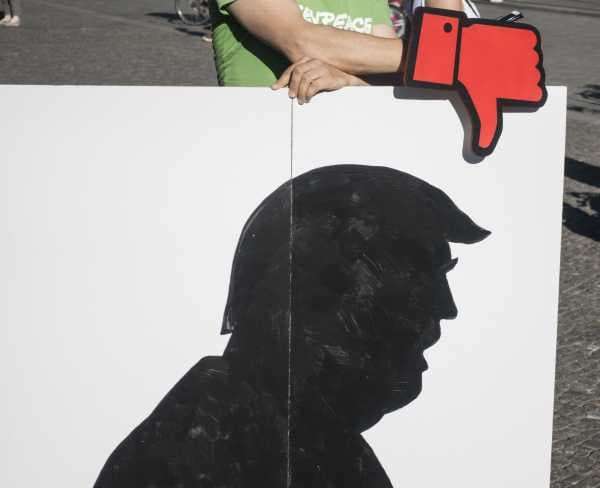
Twitter, Facebook, and other social media companies have a right to crack down on Alex Jones and anyone who violates the policies of their platforms — and there’s (probably) not much President Donald Trump can do about it.
Trump, apparently incensed by Twitter’s temporary ban of conspiracy theorist Jones, over the weekend fired off a series of tweets complaining that social media is “totally discriminating” against conservative voices and promising he won’t let it happen. He complained about the matter again in an interview with Reuters on Monday, saying it’s “dangerous” for Twitter and Facebook to “take certain people off.”
This isn’t the first time Trump has picked up on the right’s contention that there is some grand conspiracy to silence Republican voices online — just a few weeks ago, he seized on the narrative that Twitter was “shadow banning” some conservatives after a Vice News report that some Republican officials weren’t showing up in automatic search results. And conservatives have long been complaining that they believe their viewpoints are being suppressed online.
The First Amendment bars the government from infringing on speech, not private companies, and Twitter, Facebook, and any other social media companies are free to enforce their content policies. But Trump seems to be asserting he can clamp down on Twitter and stop it from enforcing its terms of service. So I asked eight lawyers and experts if he can.
The general response: Trump and Republican lawmakers could potentially try to do something to force Twitter to allow all speech, but it probably wouldn’t fly.
“The First Amendment is a strong prohibition on government officials’ ability both to limit and to compel speech from private actors,” said Emma Llanso, director of the free expression project at the Center for Democracy & Technology.
Responses from Llanso and seven other experts on whether Trump could force Twitter to allow speech and what such a move would entail, edited for length and clarity, are below.
Lata Nott, executive director of the First Amendment Center at the Freedom Forum Institute
Twitter and Facebook are private companies, so they get to make their own policies and decisions about what content is allowed on their platforms.
Could the government force them to adopt a particular content policy, like allowing all speech on their platforms? It’s possible — the government can regulate private companies that provide essential public services, like water, phone, and electric companies. Some people have argued that social media has become a similarly essential public service.
The FCC used to have a policy called the Fairness Doctrine, which required broadcasters to present controversial issues in a balanced way, giving equal time to both sides. Broadcasters argued that this violated the First Amendment, because the government was controlling their speech, essentially forcing them to present certain points of view. But the Supreme Court said that this was acceptable because there are only a limited number of broadcast frequencies, so the government can regulate the licensees of those frequencies.
This argument doesn’t really apply to the internet — there aren’t a limited number of websites, and the government doesn’t license them. But it goes to show you that sometimes the government can regulate the content policies of a private company, if it comes up with a sufficient justification to do so.
So it’s possible, but it wouldn’t be easy. It would require coming up with a whole new regulatory structure, and while Trump seems to be concerned about the censorship of conservative speech, there’s also another free speech concern about the government forcing a private company to adopt a particular speech policy.
(This probably goes without saying, but it’s also incredibly odd that a conservative president is arguing for more regulation of a private industry.)
Karen Kornbluh, senior fellow at the Council on Foreign Relations and former ambassador to the Organization for Economic Cooperation and Development
There is a common misunderstanding that digital platforms must be neutral as to third-party content they host. Yet this isn’t how they act in plenty of cases. They filter or take down intellectual property violations, terror recruitment, content that offends foreign governments, and much more. And, of course, their algorithms filter users’ newsfeeds to favor more engaging content.
By failing to be transparent or consistent about their moderation, they maximized discretion. But now they’re hoisted on their own petard. Leaving up Alex Jones, whose false, harassing campaigns forced parents of a Sandy Hook victim to flee threats of violence, and responding belatedly to a clear information attack on the integrity of US election campaigns, has led to calls for regulation.
Now, President Trump and conservatives are urging attorney general investigations for fraud or threatening to regulate digital platforms as utilities — and forcing platforms to carry content no matter how poisonous. Although these latest threats are hollow for now, they put the platforms in an increasingly difficult situation.
Kathleen Kirby, partner and co-chair of the telecom and technology practice at Wiley Rein LLP
While arguably an uncomfortable precedent for the values of free speech and diversity of opinion, it is constitutional for Twitter, Facebook, or other social media platforms to ban certain users or certain types of speech, and the government would be hard-pressed to force these private companies to allow all speech.
In the same way the First Amendment protects free expression from government intervention, it similarly protects private companies from compelled speech through government mandate, absent a narrowly tailored law designed to further a compelling government interest.
That is not to say that regulating online conversations is not a delicate balance for social media platforms. They have long been protected by Section 230 [a law under the Communications Decency Act that shields tech platforms from liability for content posted by their users], which, generally speaking, absolves them from certain kinds of liability (e.g., defamation) for what for people post on their platforms.
But the more social media sites engage in editing content as opposed to being neutral service providers, the more likely they are to lose Section 230 protection. And I fully expect that pressure for social media platforms not to police speech (unless it is clearly unprotected by the First Amendment) or otherwise engage in viewpoint censorship will continue — but that intervention cannot appropriately come from the government.
Eric Goldman, law professor at Santa Clara University
As he does daily, Trump made a factual claim without credible evidence. Beyond anecdotes (of which there are many on all sides of the political spectrum), there is no evidence that social media providers are systematically biased toward any political ideology. Instead, Trump’s tweetstorm is consistent with his standard misdirection tactic of creating a fake crisis and portraying himself as the savior.
He is trolling us. Again.
Social media providers are protected by the First Amendment’s freedoms of speech and press. This isn’t a close question. Thus, even if social media providers were biased against conservatives (and there is no evidence to support this), they would be fully permitted to do so — just like the Constitution protects Fox News’s or Breitbart’s strong editorial biases.
As a result, any action Trump might take against social media providers would be clearly and unambiguously unconstitutional. Indeed, Trump’s tweets prove that he seeks to advance one viewpoint over others. That’s literally the most fundamental way the government can violate the First Amendment.
Sadly, Trump has shown zero respect for the Constitution, so it wouldn’t surprise me if his administration tries to punish social media providers. These actions would be unconstitutional and should fail in court eventually. Until then, these unconstitutional actions would create substantial chaos and impose high costs on social media providers to vindicate their rights. That’s where our country is today — undertaking costly and wasteful efforts just to preserve the status quo.
I note that Trump threatened Twitter’s existence on Twitter, yet Twitter tolerates his vitriol, bias, and lies. Twitter should have long ago terminated Trump’s account for his repeated terms of service violations. Until it does, Twitter is a culpable enabler of Trump’s trolling.
Daphne Keller, intermediary liability director at the Stanford Center for Internet and Society and former associate general counsel for Google
We don’t have nearly enough information to see the big picture and know what speech platforms are taking down. For the most part, we only find out when the speakers themselves learn that their posts or accounts have disappeared and choose to call public attention to it. But the idea that platforms’ rules are biased — and that this undermines democracy — isn’t new, and it isn’t unique to conservatives.
Last year, for example, 70 social justice groups signed a letter to Facebook saying that African Americans and other minority groups were being unfairly silenced while the platform turned a blind eye to racist speech.
The question about potential regulation is even harder. It’s difficult to imagine a future internet where platforms don’t enforce their own rules — and in the process silence a fair amount of speech that, under the First Amendment, is clearly legal. Many would say there is a moral imperative for platforms to take down legal-but-offensive or harmful speech — including seriously disturbing material like Holocaust denial tracts and suicide how-to videos.
In any case, there is a clear commercial reason for platforms to weed out content of this sort, since it alienates both users and advertisers. That means we are unlikely to get away from some form of the current situation: platforms enforcing discretionary rules that ban legal speech, and users disagreeing vehemently with the platforms’ choices.
Legally, platforms have very free rein to take down user speech. At least two dozen people have tried suing platforms for taking down their posts or accounts. The platforms keep winning those cases. Among other things, courts have held that forcing them to host speech against their will would violate the companies’ own First Amendment rights.
Could the law change — could Congress mandate platform “fairness” among political perspectives? As a constitutional matter, the answer might well be no. Any law that took away platforms’ discretion over content removals would, per the cases so far, violate the companies’ First Amendment rights.
Powerful Supreme Court precedent — and legal interpretations supported by conservative judges like Supreme Court nominee Brett Kavanaugh — supports the platforms’ argument. A law regulating platforms’ content removals could also very easily violate ordinary internet users’ First Amendment rights, by effectively using government power to pick winners and losers among our tweets, Facebook posts, or YouTube videos.
Congress could try, of course. New internet speech laws would be fiercely litigated, with First Amendment claims from both private companies and individual speakers. Setting constitutional questions aside, many critics of today’s platforms might embrace such a regulatory approach as an improvement over the status quo. But it’s strange to hear political conservatives asking for it, particularly given their historical opposition to many of the FCC rules.
Emma Llanso, director of the Free Expression Project at the Center for Democracy and Technology
The First Amendment is a strong prohibition on government officials’ ability both to limit and to compel speech from private actors.
There are some narrow cases where the government may compel a private entity to carry a message it wouldn’t otherwise display (think nutrition labels and leaflets in your utility bill). But those tend to be cases where the compelled speech is factual and carrying it does not imply any particular opinion or endorsement by the private entity. Requirements to host particular speech based on its viewpoint or content would need to clear a much higher First Amendment bar.
In 1997, in Reno v. ACLU, the Supreme Court recognized that online speech receives the highest level of First Amendment protection — higher than broadcast, where the “equal time” rule requires broadcast radio and TV stations to provide political candidates with roughly equivalent amounts of airtime.
No such rule applies to social media sites, and it would be difficult to convince the court that one should, given the substantial First Amendment interest of a social media platform in defining its own rules and terms on the one hand, and the ample alternative online spaces for the speaker to express his views on the other.
As members of an informed public, we should certainly scrutinize the decisions that private social media companies make about what speech is and is not welcome on their platforms. But the First Amendment prohibits President Trump from requiring Twitter to carry his speech.
Heather Whitney, former fellow and lecturer at the University of Chicago Law School, and former member of Google’s global ethics and compliance team
Regulations that require or circumscribe company choices are all over the place. The Occupational Safety and Health Act (OSHA) requires companies to generally provide workers with a safe workplace. Other laws require cigarette companies to put warning labels on their products. Others still prohibit advertisers from claiming their product can do something unless those claims are backed up by evidence. The government has the power to regulate conditions and activities that affect “commerce.”
Given his language (at least sometimes), Trump seems to be under the impression that the First Amendment prohibits Twitter from prohibiting or censoring certain speech on its platform. But the First Amendment applies to the decisions Twitter makes.
While the government cannot prohibit you from writing a book critical of its policies, a publisher can refuse to publish it, a distributor can refuse to distribute it, and buyers can refuse to read it. Closer to the case at hand, while a substantial amount of hate speech cannot (for better or worse) be prohibited by the government under our current conception of the First Amendment, companies like Twitter not only can but indeed are criticized when they fail to do so. In short, if Trump is under the impression that the First Amendment prohibits companies from censoring speech generally, it is a misguided one.
There are exceptions. There are times when private actors and places can be treated like government ones, such that the First Amendment can circumscribe that company’s practices. However, these are exceptionally rare cases.
Trump’s administration has taken quite a different view in the case of internet service providers. There, both Trump’s FCC chair, Ajit Pai, and current Supreme Court nominee Brett Kavanaugh have taken the position that the First Amendment prohibits the government from enforcing net neutrality rules. If Trump thinks the government cannot prohibit ISPs from censoring content, it is hard to see why it could censor Twitter.
Trump not only needs to point to a law that empowers the state to prohibit Twitter from censoring, it must also take care that enforcing that law does not violate Twitter’s rights.
Companies like Twitter and Google have repeatedly argued that they have a First Amendment right to choose to include and exclude whatever content they want. In other words, they argue that they are speakers and their choices here count as “speech.” While lower courts have endorsed this position, the Supreme Court has yet to weigh in. Whether it will endorse this position remains to me non-obvious.
Kate Klonick, law professor at St. John’s University and resident fellow at the Information Society Project at Yale
Most of the time when you’re talking about these platforms policing speech, there is no First Amendment question because the First Amendment is about what government can stop you from saying or if the government can force you to have a space to say. When you’re talking about them taking down Infowars or pornography on their sites, they have the freedom to do that because they don’t have First Amendment standards that they’re tethered to. These are private people posting to their sites, they are private sites, and the government is never in the picture in the first place.
But it would be the government setting speech policy if Trump was trying to tell a platform what it can and can’t say. The most likely answer to “Can Trump force Twitter to allow all speech?” is just emphatically, no.
From a case law perspective, you have to look at how platforms would be analogized to other private entities that that post and curate speech.
If you compare Twitter or Facebook to the press, there was a case called Miami Herald v. Tornillo, in which Florida passed a law that said that newspapers had to allow equal space to political candidates related to political editorial or endorsement. In reviewing the law, the US Supreme Court said absolutely not. The press is different; the press has special First Amendment rights, and the First Amendment protects their editorial judgment.
You can easily analogize Twitter and the claims to equal representation of political viewpoints to the facts in Tornillo. So if Twitter or a platform can argue that they’re the press, then something like Trump forcing them to allow all speech, that’s just never going to happen. Even if these platforms are seen more like broadcast television, the argument made by the court in past cases that have allowed more content regulation of those mediums was based around the now slightly outmoded idea of spectrum scarcity. The internet doesn’t have those scarcity issues.
Another way to think about Twitter isn’t as a media entity at all but as a type of public-private accommodation, like a shopping mall. That was the issue when a mall in California tried to use state trespass laws to keep counterprotesters from demonstrating and handing out literature there, in Pruneyard v. Robins. In a very narrowly decided case, the Supreme Court stated that the shopping mall was akin to a public square, even though it was privately owned.
You can kind of see how the right or Republicans might be holding on to Pruneyard and might be trying to make an analogy between Twitter being a public square and this. It would be a bit of a large leap for the Court to read the situation with Twitter and then apply Pruneyard directly, since there just isn’t precedent.
Finally, you can also argue that Twitter itself as a platform has its own speech rights — and that Trump clamping down on how Twitter curates would be infringing on its own speech rights and its ability to make choices about its content.
First Amendment case law aside, the far more interesting question is: Even if conservatives and Trump got their way and pegged Twitter to a First Amendment-type standard, would they actually want that result? Right now, under the First Amendment, pornography is completely legal; you cannot block it or ban it.
So pornography, spam, hate speech, all the things we’ve wanted to come down on Twitter, they’d all stay up. I think that’s actually a world that conservatives don’t want, and they’re not fully thinking through what it would mean to tether Twitter to an allow-all-speech policy.
Sourse: vox.com






